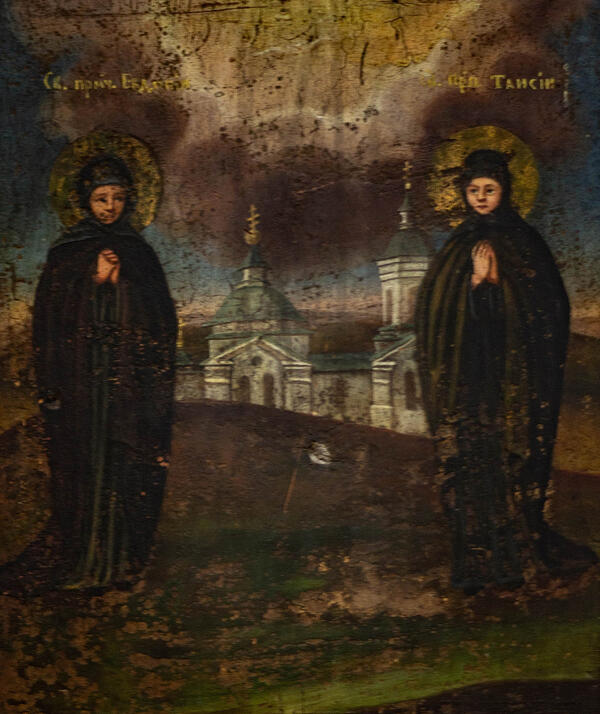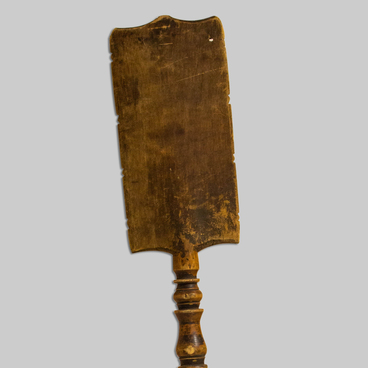The icon displayed at the Fyodor Reshetnikov Museum depicts two Christian saints: Martyr Eudokia of Iliopol and Reverend TaIsia of Egypt.
Eudokia was a Samarian woman who lived in Heliopolis of Phoenicia. She was very beautiful and built up her fortune by attracting and servicing wealthy lovers. One night, Eudokia heard a Christian prayer and in the morning she called a man who was praying. It was a monk by the name of Germanus. As instructed by the old man, she locked herself up in her chamber, fasting and praying. Soon, Eudokia converted to Christianity and gave all her wealth to Bishop Theodotus of Heliopolis. She took the monastic vows in a convent. After the death of the convent hegUmenia, Eudokia, who was famous for asceticism, was elected her successor. The authorities heard rumors that a treasure was hidden in the convent, and the local ruler sent soldiers to search the it. According to hagiography, the soldiers could not enter the convent for three days, held by divine power. Eudokia had a vision that she was destined to suffer for Christ. She took the holy sacraments and voluntarily gave herself to the soldiers. Eudokia was brought to exarch Diogenes, who was impressed by her beauty, but she called herself a Christian and accepted a martyr’s death.
Taisia, according to her hagiography, was the daughter of a courtesan who taught the girl her craft. Taisia became a wealthy courtesan who lived off men. Having heard about it, Holy Reverend PaphnUtius came to her. After a conversation with him, Taisia burned all the treasures she had earned on the city square. Then she went to the nunnery, where she shut herself in the cell for three years. Three years later, Paphnutius went to Anthony the Great to find out if God had forgiven Taisia. Anthony ordered his apprentices to pray for an answer, and one of them, Paul the Simple, had a vision: a bed in the sky, covered with the clothes of amazing beauty; the bed was guarded by three divas with beautiful light faces. Paul was delighted to think that this heavenly bed was given to his father Anthony. Then he heard a voice saying: “No, it is not for Anthony, but for the courtesan Taisia”. This is how Paphnutius learned God’s will about Taisia. He took Taisia out of her cell, but 15 days after that she fell ill and died three days later.
Eudokia was a Samarian woman who lived in Heliopolis of Phoenicia. She was very beautiful and built up her fortune by attracting and servicing wealthy lovers. One night, Eudokia heard a Christian prayer and in the morning she called a man who was praying. It was a monk by the name of Germanus. As instructed by the old man, she locked herself up in her chamber, fasting and praying. Soon, Eudokia converted to Christianity and gave all her wealth to Bishop Theodotus of Heliopolis. She took the monastic vows in a convent. After the death of the convent hegUmenia, Eudokia, who was famous for asceticism, was elected her successor. The authorities heard rumors that a treasure was hidden in the convent, and the local ruler sent soldiers to search the it. According to hagiography, the soldiers could not enter the convent for three days, held by divine power. Eudokia had a vision that she was destined to suffer for Christ. She took the holy sacraments and voluntarily gave herself to the soldiers. Eudokia was brought to exarch Diogenes, who was impressed by her beauty, but she called herself a Christian and accepted a martyr’s death.
Taisia, according to her hagiography, was the daughter of a courtesan who taught the girl her craft. Taisia became a wealthy courtesan who lived off men. Having heard about it, Holy Reverend PaphnUtius came to her. After a conversation with him, Taisia burned all the treasures she had earned on the city square. Then she went to the nunnery, where she shut herself in the cell for three years. Three years later, Paphnutius went to Anthony the Great to find out if God had forgiven Taisia. Anthony ordered his apprentices to pray for an answer, and one of them, Paul the Simple, had a vision: a bed in the sky, covered with the clothes of amazing beauty; the bed was guarded by three divas with beautiful light faces. Paul was delighted to think that this heavenly bed was given to his father Anthony. Then he heard a voice saying: “No, it is not for Anthony, but for the courtesan Taisia”. This is how Paphnutius learned God’s will about Taisia. He took Taisia out of her cell, but 15 days after that she fell ill and died three days later.



